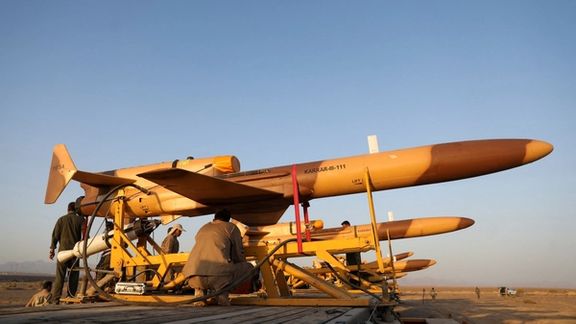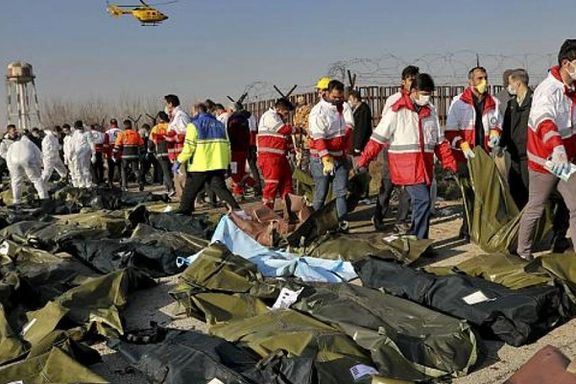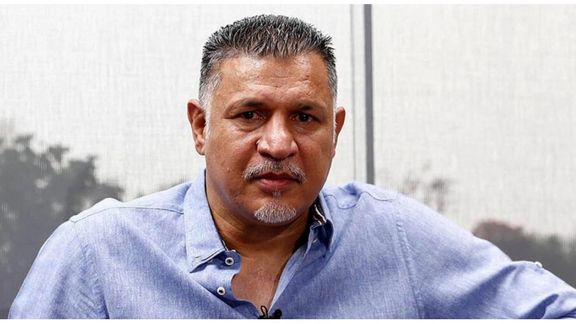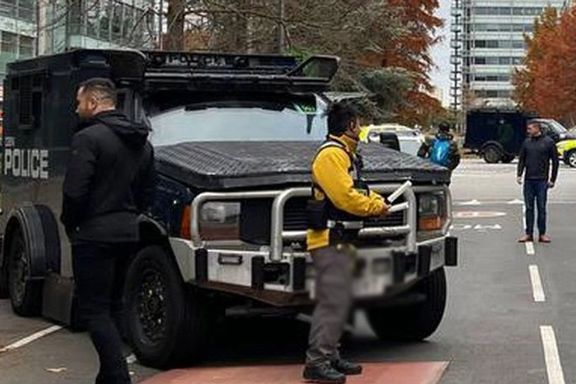Ukraine Shoots Down 11 Iranian Drones In Latest Russian Barrage

As Russia launched its 10th large-scale missile attack on Ukraine Thursday, it also used Iranian-made drones to try to overwhelm Kyiv’s air defenses.

As Russia launched its 10th large-scale missile attack on Ukraine Thursday, it also used Iranian-made drones to try to overwhelm Kyiv’s air defenses.
Moscow fired 69 cruise missiles and an undetermined number of Iranian suicide drones. Ukrainian officials said that they had shot down 11 Iranian-made drones and most of the missiles.
Observers were anticipating a large-scale Russia missile attack to disrupt electricity and water for Ukrainians on New Year eve, but Ukraine’s air defenses have substantially improved, and the damage Thursday seemed to be manageable.
Iran’s delivery of hundreds of Shahed-131 and 136 drones to Russia has enraged the West that is assisting Ukraine to resist Moscow’s invasion. Western officials have been citing Iran’s weapons deliveries as one reason why they are not inclined to continue nuclear talks with Tehran.
Iran has claimed that it delivered the drones before the war, but it has not clearly denied their use in attacking Ukraine.
The United States is scrambling to try to "choke off Iran’s ability to manufacture the drones” as US forces help “Ukraine’s military to target the sites where the drones are being prepared for launch…,” according to a source that spoke with the New York Times.
Russia’s missile and drone attacks started in September targeting Ukraine’s civilian infrastructure after its military campaign began to unravel. So far Ukraine has shot down 430 drones Russia has used in conjunction with the missile barrages. Most of these drones are believed to have been Iranian made.

As US officials briefed the flagship New York Times on efforts to stop Iran sending drones to Russia, the Jerusalem Post played down “a new era of drone wars.”
A 2,000-word New York Times story published December 28 was based on un-named United States officials proclaiming Iran and Russia to be “building a new alliance of convenience.” This had prompted an “expanding US program…to choke off Iran’s ability to manufacture the drones” as US forces help “Ukraine’s military to target the sites where the drones are being prepared for launch…”
But the day before the Times outlined the “breath of the [US] effort,” the Jerusalem Post was more sanguine. “No matter how many Iranian drones Russia has access to, it can’t defeat Ukraine,” it noted. With the vast majority of the drones used by Russia easily shot down, “big army formations like tanks, infantry and artillery, still decide wars,” the Post observed.
The newspaper also conceded that while Iran had developed drones due to its lack of an effective air-force in the face of international sanction, Israel, whose advanced US-supplied aircraft include F35s, was “one of the world’s leaders in drone technology.”
‘An important tool’
Both the Ukraine war and a trumpeted ‘Iranian threat’ are boosting Israel’s weapons sales, including to disillusioned customers of Russia, as its arms exports reached a record $11.3 billion in 2022. “Iran…is suddenly sending drones to Russia, and is forming a military and security alliance with Russia…the war is helping Israel in that sense…as a by-product Israel is increasing its share of the arms market,” Yossi Melman, Haaretz Intelligence correspondence, told Voice of America December 22.
“Iranian military technology is seen as an important tool against the growing threat of Iranian military power – the concern about Iran is shared by both European and Middle Eastern countries,” VOA said.
But while Iran’s supply of drones to Russia – and Tehran claims these were sent before the current phase of conflict began February – has helped Israel’s arms sales, the US has been less successful, the New York Times reported, in hampering Iran’s drone industry given the expertise developed by Iran over many years evading American sanctions and surveillance. This was, the Times said, “proving as difficult as the decades-old drive to deprive Iran of the components needed to build the delicate centrifuges it uses to enrich near-bomb-grade uranium.”
Israeli expertise in “undermining Iran’s nuclear program” could help over Iran’s drone exports, the paper suggested: “In the effort to stop the drone attacks,” the Times said, “Mr Biden’s [President Joe Biden] aides are also engaging an ally with a long history of undermining Iran’s nuclear program: Israel.”
The Times referred to a recent video meeting between Jake Sullivan with Israel’s top national security, military and intelligence officials – which came as talk increases in Israel of a military attack on Iran and as Benjamin Netanyahu returns to power with the support of ultra-Zionists. “The fact that the administration chose to highlight the discussion…was notable,” the Times observed.

Britain, Canada, Sweden, and Ukraine have formally launched a process to hold the Islamic Republic accountable for shooting down a Ukrainian airliner over Tehran.
Nearly three years after Iran’s Revolutionary Guard shot down Flight PS752 shortly after takeoff from Tehran with two surface-to-air missiles, the four countries have urged Iran to agree to arbitration as Tehran has stonewalled over an independent investigation and proper compensation.
All 176 people onboard died in the January 8, 2020 incident, with dozens of Canadians among them.
The International Coordination and Response Group representing the affected countries issued a joint statement Wednesday to hold Iran accountable.
“We have requested that Iran submits to binding arbitration of the dispute related to the downing of Flight PS752…pursuant to Article 14 of the Convention for the Suppression of Unlawful Acts against the Safety of Civil Aviation of 1971.”
The convention requires all signatories to prohibit, prevent and punish certain the unlawful and intentional destruction of an aircraft in service.
The four countries as well as Iran are parties to the convention which was signed in Montreal in 1971.
If they cannot come to an agreement upon arbitration within six months, the case can be taken to the International Court of Justice.
In May 2021, some family members also filed a civil lawsuit against the government and senior officials they believe were to blame for the incident. Canada’s Ontario Court ruled that the downing of the plane was an intentional act of terrorism.

A Ukrainian parliamentarian says Iranian-made drones’ destruction of her country’s power plants and other infrastructures by Russia to deprive the people from electricity is an act of terrorism.
“Every week we see Iranian drones over our heads destroying our buildings and civil infrastructure like electricity stations, leaving millions of people without power. It's terrorism and genocide of civilians," Yulia Klymenko, a senior Ukrainian MP told Iran International Tuesday.
The United Nations is investigating the origins of the downed drones in Ukraine. Earlier this month, Reuters quoted Secretary General Antonio Guterres as saying that any findings would be reported to the Security Council “as appropriate, in due course.”
Kyiv has accused Tehran of supplying 1700 Shahed-136 loitering munitions to Moscow, which it says have been used to hit targets in Ukraine since September. Iran denies the allegations.
Klymenko said the loss of electricity and heating caused by the drone attacks is affecting millions including women and children. President Volodymyr Zelensky said Tuesday that nearly nine million Ukrainians are left without electricity as of December 26.
Expressing disappointment over Tehran's support for Moscow inthe war against Ukraine, Klymenko stressed that PresidentVolodymyr Zelensky has clearly condemned Iran's involvement in the Ukraine war.
A top Ukrainian official, presidential aide Mykhailo Podolyak, on Saturday called for the “liquidation” of Iranian factories making drones and missiles, as well as the arrest of their suppliers. Such remarks have “political and legal consequences,” the Iranian foreign ministry spokesman, Nasser Kanani, said Monday in response without further elaboration.

Iran has forced a Dubai-bound Mahan Airlines plane to land in its Kish Island to prevent the family of an outspoken football legend from leaving the country.
Mahan commercial flight 063, carrying Ali Daei's wife and daughter, which had left Tehran airport at 11:15 am local time for Dubai, was grounded by security personnel at Kish airport in a strange and rare act.
Eyewitnesses have told Iran International that the security agents forced Daei’s family to disembark saying that they cannot leave the country.
In response to the incident, Daei said, “Today, my wife and daughter legally boarded a plane from Imam Khomeini Airport [in Tehran] to go to Dubai, but the plane was returned from Dubai and landed in Kish to drop off my daughter and wife.”
He added that they are not arrested, but if the family was banned from leaving Iran, the police should have told them upon passport check.
Ali Daei is a hero for Iranians as he was an international soccer legend and the captain of the national team from 2000-2006. His record of 109 international goals was broken only 2021 by Cristiano Ronaldo.
“No one has given me an answer. I really don't know what the reason is for such moves. Did they want to arrest a terrorist? My wife and daughter were going to Dubai for a trip and their return flight was on Monday,” noted Daei.

“It’s hard to believe! They passed through the passport control and boarded the plane quite legally, but they [security forces] returned so many passengers from Dubai to drop off my wife and daughter. If there was a problem, why didn't they arrest them? If there is no problem, why did they bring them back?” Daei reacted.
However, state-run news agencies Tasnim and ISNA have quoted an “informed source” as saying that Ali Daei's wife had been barred from leaving Iran “because of inviting people to go on nationwide strikes, but she had managed to revoke the ban through an unlawful way.”
Daei's wife was barred from traveling to Dubai before leaving Iran upon a Judicial order and a decision by the National Security Council headed by the President, the news agencies claimed.
The Islamic Republic's Judiciary alleges that Daei's wife had previously pledged to inform security organs of her decision to travel abroad in advance. However, once the relevant authorities learned about the flight, the plane carrying her was forced to land in Kish.
It’s not clear where the plane has headed after dropping off Daei’s wife and daughter – whether it continued to Dubai or flew back to Tehran.
Many other legendary Iranian soccer players such as Ali Karimi, who is abroad and Mahdi Mahdavi-Kia, Karim Bagheri, Ahmad Reza Abedzadeh, and others are supporting the protest movement.
Earlier this month, security forces sealed a jewelry shop and restaurant belonging to Ali Daei after he shut down his businesses to join anti-government strikes.
Daei had also revealed he was threatened after throwing his weight behind the anti-regime protests triggered by the death of Mahsa Amini in mid-September.
The nationwide protests in Iran have continued for 101 days with regime forces killing hundreds of people and detaining thousands of others, including football players and celebrities.
Earlier, Daei decided not to travel to Qatar to attend the World Cup 2022 due to the brutality and deadly force used by the government against unarmed protesters.

London’s Metropolitan Police detained a man Monday under the Terrorism Act, close to Iran International’s offices, after he was observed acting suspiciously.
Details of the incident are not available yet, including if the suspect was linked to any security risk related to Iran International.
In mid-November, Iran International was informed that elements connected to Iran’s intelligence services posed a threat to two of its journalists. A few days later, the police positioned armored vehicles outside the headquarters of the television network in London and other security measures were put in place.
Islamic Republic officials have used threatening language speaking about Iran International, which has been reporting around the clock on the popular protests in Iran since mid-September.
Tehran has accused “enemies” of fomenting the unrest, which began when Mahsa Amini, a 22-year-old woman was killed in police custody. She was arrested for her ‘improper hijab.’
The term ‘enemies’ in the official Iranian jargon usually means the United States, United Kingdom, Israel and Saudi Arabia.
The Islamic Republic has been persecuting journalists for decades, but began a harassment campaign against foreign-based Iranian journalists more than a decade ago, by direct and indirect threats, including against family members still residing in Iran.